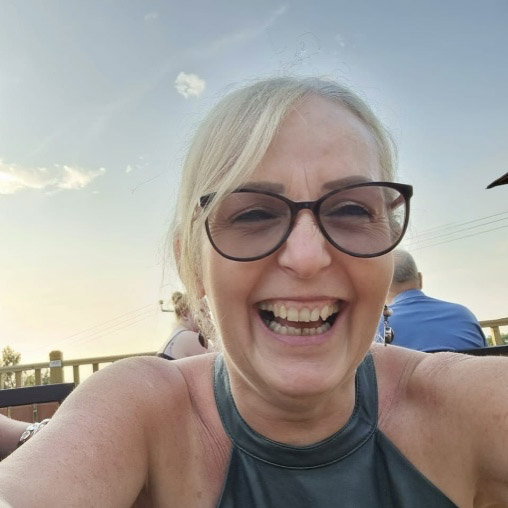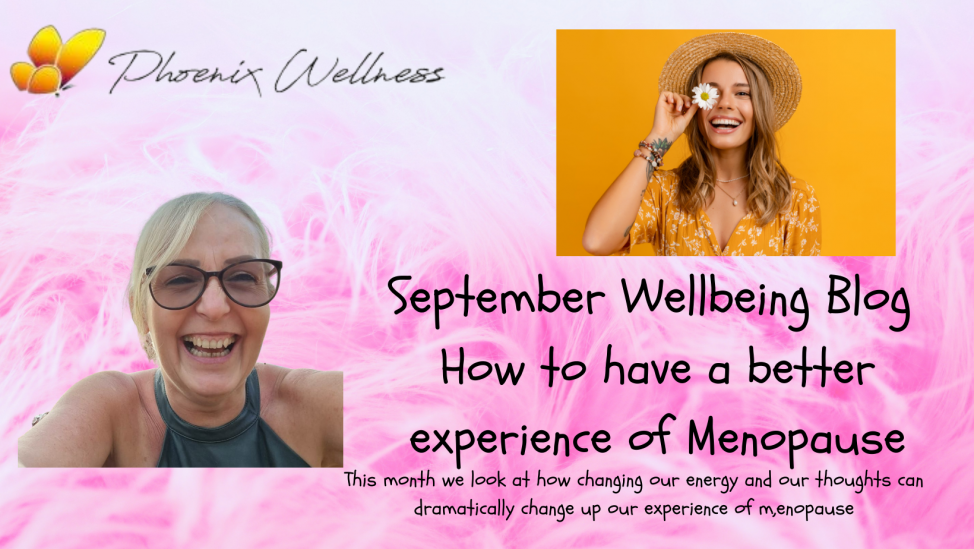
Welcome to my September blog and I thought I’d reflect on our individual experiences of menopause and how much these vary from woman to woman.
If you are just visiting our blogs for the first time, then I am delighted to have you join us and hope you find something in our discussion that resonates and helps you.
I know, and tell my clients all the time, that there isn’t one experience of menopause or a “normal” journey through menopause. Why is this? We are all different and all unique. This is part of the reason why it can seem quite hard to get the right support when you need it. Our health system works on the law of averages and caters accordingly. This isn’t wrong, it just means that if your experience sits outside that “normal” you may find it difficult to get heard and supported. I know that as menopause experts we talk about the average age at which a woman will experience menopause – that’s around 50-52 years of age. I know from my own experience talking to women from all around the world, that this doesn’t necessarily ring true anymore. I am hearing more women starting to see the signs of menopause at a much younger age – one of my clients was 39 and another 42, and let’s not forget the lovely Val who joined my podcast to share her experience of menopause at age 36! So, getting the support we need can feel like an uphill battle.
Then of course, not every woman has a “standard” experience of menopause.
We read and hear so much about all the negative and difficult experiences, but don’t get me wrong, for many women (me included) menopause can be hard and feel like it’s never going to end or get better! However, I have met a couple of women recently who’ve joined my courses and retreats simply because they say “they don’t know if they are in menopause or not”! This sounds strange as you’d think you would know but that isn’t necessarily the case. If you have a hysterectomy for instance, you will skip perimenopause and go straight to menopause and that can bring the usual symptoms but also may not; or you may be using contraceptives such as a IUD or an implant that means you’ve not had a period for sometime or have had a “false” bleed, plus these devices can mask hormonal fluctuations. Then there are those lucky ladies who experience little or no symptoms of menopause so the whole experience passes them by. I met one lady recently who had experienced so many period issues in her younger years that she didn’t notice any changes in her cycle until her periods ceased completely at menopause.
So, for all these reasons it makes it so difficult for women to get the support they need as the old one-size fits all approach just doesn’t serve them. Remember if your GP says you’re too young to be menopausal, and yet you know you are seeing the tell-tale signs, don’t be ignored, make sure you get heard. But there is still more we can do ourselves to help us to have a better menopause experience.
Can your energy help, or hinder your menopause experience?
Yes 100% it can! When we have low energy and expect to have a bad experience of menopause, or in fact anything in our lives, then that is precisely the experience we will get. But when we can lift our energy, to have a positive, hopeful outlook and manage our expectations then our experience can be so very different. This is called energetically matching your desire.


What do I mean by “energetically matching your desire”? This can be a hard concept to grasp and recently I asked the ladies in my private Facebook group whether they thought they were energetically matched to their menopause experience – some got it but many did not 😊 Let me tell you a story about how I came across this phrase and started reflecting on the impact of my energy on my own journey.
I am an avid consumer of podcasts – I find them so uplifting and there’s nothing better than getting out for a walk with my favourite podcast for company. One of the ones I dip into regularly is by @jessicasol (find her on Instagram). Jessica Sol is an embodiment coach and mentor from Australia and her podcast is amazing. Well, she was talking about being energetically matched to your desire. She talked about how many times her clients complain that things just aren’t going well or what they wanted to achieve just didn’t happen for them. There are many reasons for this but the biggest is their energy and internal dialogue wasn’t matched to the desire they sought.
I took this on board in my own business and after much reflection realised, I had not been energetically matched to my business desires – I hadn’t sold any places on my next course and was getting more and more frustrated and desperate by this. During my mediation I realised the reason was quite simply that my thoughts were all negative, telling me that I couldn’t succeed. I knew this wasn’t true and so I did the internal work to stop my negative thoughts in their tracks – every time a doubting thought entered my mind, I practiced the Stop Think Again method that I teach my clients and changed the thought. Almost instantly my energy changed. I became more lively, happier, optimistic and positive. I felt like I’d lifted the lid on my energy and dumped that negative weight elsewhere. The outcome – one course sold out straight away and another almost sold out! You see it works.
How can you apply this to menopause?
Change the negative, low energy thought into a positive, high energy one. Match your thoughts to the experience you want to have rather than to the one you have been told you’re likely to have. Believe your experience can be different, and I guarantee it will be. Here are some tips
- Catch the negative thought before it takes hold – this is about noticing your thoughts and recognising the impact they have on your energy and experiences. Remember your brain is the most powerful muscle in your body which can help or hinder your experience. Every time you spot a negative thought use the STOP THINK AGAIN method. Spot the thought, physically tell yourself STOP, thank your brain for the thought as it’s only trying to keep you safe but remind it you don’t want to think that way, then reach for the next most positive thought you can and harness it.
- Use positive affirmations to lift your mood – these are powerful. Sit down and reflect on the experience you want to have through menopause. Write down those positive statements. Make them personal and active to have the most impact. Recite them to yourself or read them daily and always bring them into your mind when a negative thought pops up for you.
- Change your language around menopause – this is powerful and there is new research that suggests changing your language and thoughts can have amazing results. The latest thinking around menopause support is to have an holistic approach that utilises Cognitive Behaviour Therapy (CBT) and Neurolinguistic Programming (NLP) techniques alongside medical interventions to lessen or better manage the negative symptoms of menopause. So don’t think “oh no another hot flush” think instead “thanks for the hot flush I know my brain is working hard for me” or “thanks for the hot flush as I get to go for a cooling walk” or better still see the hot flush as a little nudge to take some time for you.
- Train your brain to think differently – this is harnessing visualisation to improve your experience – again pulling on NLP techniques. Every time you experience a hot flush, take a deep breath and imagine you are walking into a cold shower or a mountain lake. Recall all those emotions and sensations associated with that activity – focus on the sudden cold feeling, the shiver, the goosebumps, perhaps how the cold takes your breath away – I bet in no time at all your hot flush will be gone.
All these simple actions will have the result of igniting your positive energy, so you become more energetically matched to have a good experience. I hope this helps but remember, it can take time to get a result from a new approach, so hang in there and every time you think this isn’t working, change that the thought and tell yourself I’m doing the best for my mind and body and the good will follow.

For more help
If this resonated, then I am delighted as that’s my aim. But if you’d like to learn more or feel you want more support with your menopause journey then I am here to help. Reach out, connect and we can talk.

